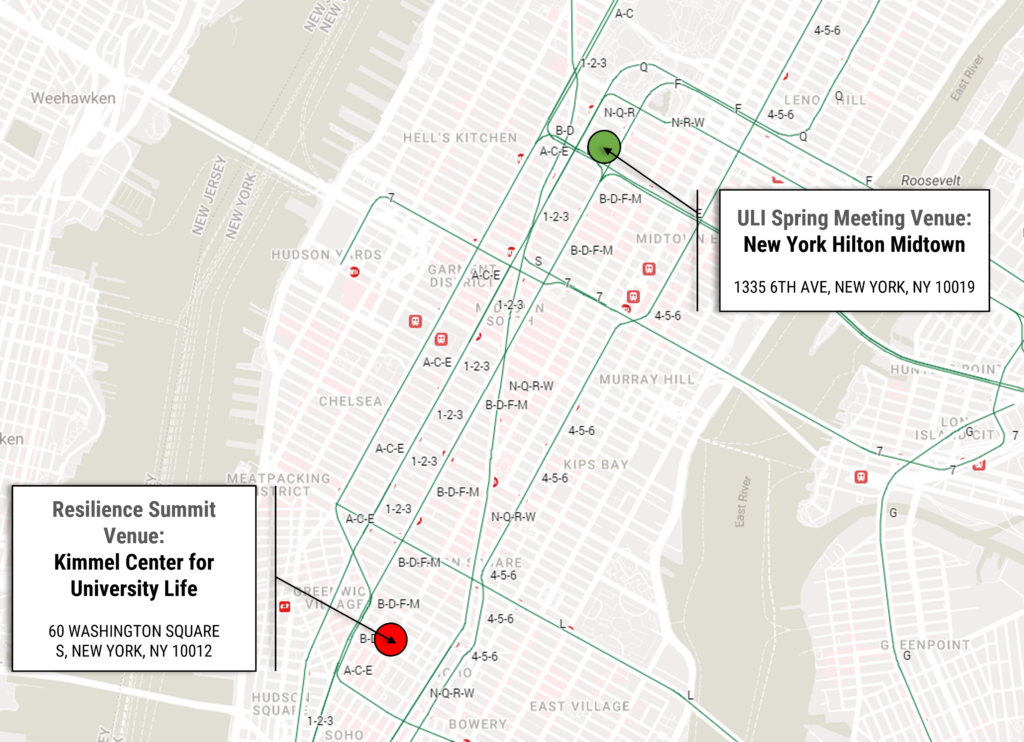2024 Resilience Summit
The ULI Urban Resilience Program will host its 5th annual Resilience Summit in New York City on April 12, 2024.
The Resilience Summit is ULI’s flagship climate adaptation event; convening industry leaders in real estate and resilience from around the world to address the challenges and harness the opportunities posed by climate risks.
With attendees ranging from owners, developers, and architects to government officials and planners, the Resilience Summit offers a rich tapestry of insights and experiences to catalyze investment in risk reduction strategies, preserve and protect real estate value, and create thriving communities.
Participants will learn about cutting edge solutions that promote proactive change in the face of a rapidly changing climate while engaging with global thought leaders and exploring innovative buildings and developments that showcase resilience in practice.
As the world rallies to address the challenges of climate change, the Resilience Summit offers a platform for gaining valuable knowledge, creating meaningful connections, and catalyzing innovative solutions.

The 2024 Resilience Summit will be held in New York City, New York, on April 12, 2024, from approximately 9 am to 4 pm Eastern at the NYU Kimmel Center (60 Washington Square S). From decision-making to financing to action, the Resilience Summit will include three concurrent tracks of content.
9:00am – Welcome & Opening Keynote Elijah Hutchinson
Elijah Hutchinson is the Executive Director of the NYC Mayor’s Office of Climate & Environmental Justice (MOCEJ), helping NYC achieve one of the most ambitious climate agendas in the country. MOCEJ develops policy and manages programs that advance climate mitigation efforts and prepare NYC for the unprecedented challenge of the impacts of climate change, while improving the health and quality of life for all New Yorkers. Previously, Elijah led coastal resilience and new greenway initiatives as vice president for waterfronts at the New York City Economic Development Corporation (NYCEDC). He also established the resilience practice at NYCEDC, working to integrate climate, resiliency, hazard mitigation, and sustainability into a multibillion-dollar portfolio of neighborhood infrastructure, open space, transportation, and mixed-use development projects.
Track 1: Climate Risk and Real Estate
This track will explore how leading real estate developers and investors are tackling climate risk in their real estate decision-making—leveraging new data and tools for climate risk assessment, preparing for greater climate risk disclosure, and navigating the changing landscape of legal and insurance risks driven by climate change. Sessions will include the following:
| 10:45am concurrent session: | Climate Risk Disclosure: How to Assess and Report Assets’ Physical Climate Risk
|
| 1:00pm concurrent session: | Integrating Climate Risk Data into Real Estate Investment Decision-Making
|
| 2:15pm concurrent session: | Climate Risk and the Future of Liability and Insurance
|
Track 2: Financing Decarbonization and Resilience
This track will uplift new and emerging opportunities to channel private and public capital into development projects that help communities and building owners achieve their resilience, decarbonization, and equity goals. Sessions will include the following:
| 10:45am concurrent session: | Creating a Green Transition for All Communities
|
| 1:00pm concurrent session: | Funding City-Scale Resilience
|
| 2:15pm concurrent session: | Financing Resilient Real Estate
|
Track 3: Solutions for Reducing Climate Impacts on Assets and Cities
This track will be an interactive opportunity to explore policies, urban planning strategies, and design solutions that mitigate physical climate risk at the building and city level. Deep-dive sessions on specific physical climate risks will include the following:
| 10:45am concurrent session: | Implementing Extreme Heat Strategies
|
| 1:00pm concurrent session: | Enhancing Flood and Coastal Resilience
|
| 2:15pm concurrent session: | Addressing Water Scarcity
|
3:30pm – Closing Keynote Shalini Vajjhala
Shalini Vajjhala, PhD is the Executive Director of PRE Collective and the Founder & CEO of re:focus partners. She is a nationally recognized infrastructure and climate resilience expert with nearly two decades of experience designing, funding, and financing community-centered resilient infrastructure solutions. Previously, Shalini served as Special Representative in the Office of Administrator Lisa Jackson at the Environmental Protection Agency where she led the US-Brazil Joint Initiative on Urban Sustainability (JIUS). She also served as Deputy Assistant Administrator in the Office of International & Tribal Affairs at the US EPA and as Deputy Associate Director for Energy and Climate at the White House Council on Environmental Quality. She is currently a Board Member of Smart Growth America and a nonresident senior fellow with the Brookings Institution Metro Program.
2024 Resilience Summit Sponsors
Silver
 |
Bronze


|
Friend
 |
One of the many ways to get involved and showcase your company’s commitment to this important initiative is by aligning your company’s brand with the 2024 ULI Resilience Summit. Your sponsorship supports both the event itself and the ongoing work of ULI’s Urban Resilience Program, advancing a brighter, more resilient future.

Resilience Summit Pricing
| Early Bird Pricing (before 2/7) |
Regular Pricing | |
| Private (Member) | $195.00 | $250.00 |
| Public/Academic/Nonprofit (Member) | $150.00 | $195.00 |
| Retired (Member) | $195.00 | $250.00 |
| Student (Member) | $150.00 | $195.00 |
| Under 35 (Member) | $195.00 | $250.00 |
| Private (Nonmember) | $245.00 | $295.00 |
| Public/Academic/Nonprofit (Nonmember) | $245.00 | $295.00 |
| Student (Nonmember) | $245.00 | $295.00 |
| Under 35 (Young Professional, Nonmember) | $245.00 | $295.00 |
How to Get There
The Resilience Summit will take place at the New York University Kimmel Center.

* A shuttle departing at 8:30 AM ET from the Hilton Midtown will be available to Resilience Summit attendees.
Directions from Spring Meeting (Hilton Midtown)
- Walk: From Hilton Midtown, walk southeast on 6th Ave, turn left onto W 57th St to reach the 57th Street-7th Avenue Station (5-minute walk).
- Metro: Take the southbound N, Q, or R train from 57th Street-7th Avenue Station. Get off at the 8th Street-NYU Station after about 4 stops (10-minute ride).
- Walk: Exit the station, Head southwest on Broadway toward Washington Pl.
Turn right onto Washington Pl
Walk through Washington Square Park to Washington Square S and LaGuardia Pl (6 min walk) - Arrive at NYU Kimmel Center
Hotel Accommodations
Hotel accommodations for the Resilience Summit are available on a first come, first service basis as part of the ULI Spring Meeting room block. If a hotel reservation is not made at the time of registration, a hotel booking link can be found in the registration confirmation email. The last day to book a room within the ULI room block is Friday, March 22 at 12pm EST.
Tour Opportunities
Resilience Summit attendees may also engage in tours offered as part of ULI’s Spring Meeting. Separate tour registration is required.
East Side Coastal Resiliency Projects (MANHATTAN) – OPEN
The East Side Coastal Resiliency (ESCR) Project is a coastal protection initiative jointly funded by the City of New York and the federal government, aimed at reducing flood risk due to coastal storms and sea level rise on Manhattan’s East Side from East 25th Street to Montgomery Street. ESCR is a one-of-a-kind, forward-thinking resiliency project being constructed in a dense urban environment with complex below and above-ground infrastructure. The 2.4-mile flood protection project is intended to build physical, social, and economic resiliency, strengthening the City’s coastline while improving waterfront open space and accessibility.
From Former Super Fund Site to an Equitable, Resilient, and Sustainable Gowanus (BROOKLYN) – SOLD OUT
The Gowanus neighborhood has historically been best known for the toxic sludge-filled canal that runs through its center. Sandwiched between three quintessential brownstone neighborhoods – Park Slope and Caroll Gardens/Cobble Hill – this 82-block swath of Brooklyn has until recently been home to gritty mix of industrial uses, with a dash of off-beat bars and BBQ joints. After a decade-long zoning overhaul that came into effect in 2022, the Gowanus is now in the middle of a dramatic transformation. A vibrant mixed-use neighborhood is emerging that eventually will include over 8,200 new apartments, including 3,000 affordable units, 500,000 SF of commercial and “maker space,” and a verdant esplanade that lines both sides of a cleaned-up canal.
Visit groundbreaking resilience-focused projects in Rockaway, Queens. The Arverne East project is a master-planned development transforming a 116-acre oceanfront site, composed of a 35-acre publicly accessible nature preserve, mixed-income housing of various tenure, diverse neighborhood retail, parking, and infrastructure. This project also includes a boutique hotel, recreation spaces, an urban farm, and both short- and long-term uses to encourage economic development, cultural programs, and community health and wellness. Arverne East will also include a district geothermal ambient loop, which will tie into individual building systems for increased efficiency and reduced consumption in heating, cooling, and domestic hot water.


